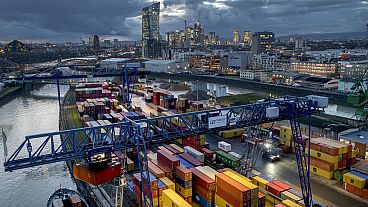About 56% of global chief economists feel that the world is likely to see increased economic weakness in the coming year, whereas seven out of 10 believe there will be more rifts.
The World Economic Forum's leading economists have painted a less-than-rosy picture for the coming year.
Against the backdrop of the WEF's 54th annual meeting in Davos this week, the Chief Economists' Outlook for January 2024 forecasts lacklustre growth in Europe and the US, as well as global economic fragmentation.
"Amid accelerating divergence, the resilience of the global economy will continue to be tested in the year ahead," said Saadia Zahidi, the WEF's managing director said.
"Though global inflation is easing, growth is stalling, financial conditions remain tight, global tensions are deepening and inequalities are rising- highlighting the urgent need for global cooperation to build momentum for sustainable, inclusive economic growth," she added.
US and Europe likely to see slow economic growth
Some 43% of surveyors predict weak economic growth in the US for the coming year, with 77% expecting the same for Europe and 31% for China.
Another 13% also believed that both the US and Europe would continue to face high inflation this year.
The outlook for Asia, comprising of South Asia, Central Asia, East Asia and the Pacific, remained somewhat more positive than most of Europe and the US. However China remains a bit of an exception, as weak demand and industrial production, as well as property sector woes, continue to weigh on the market.
However, most economists also expect noticeable growth in parts of Latin America, Central Asia and Sub-Saharan Africa.
Global fragmentation could lead to increased volatility
About 70% of chief economists feel that global economic fragmentation will speed up in 2024, with around 56% believing that the global economy will continue to slow down this year. According to 80% of respondents, geopolitics will lead to increased volatility in stock markets, with 87% voting for more volatility in the global economy.
Some 80% also felt that geoeconomic blocs would tighten and strengthen, with 57% expecting the gap between the Global North and Global South to grow in the coming three years.
Two-thirds of survey respondents believed that new and upcoming industrial policies would support the rise of new growth hotspots. However, rising financial burdens and a growing economic rift between the Global North and Global South are also likely to lead to increased geopolitical tensions and resentment.
AI likely to be adopted more, but unequally
Artificial intelligence growth and adoption remains one of the most closely-watched technological trends this year, with 40% of survey respondents believing that generative AI tools such as ChatGPT will become commercially disruptive.
Around 37% of respondents were still uncertain, mainly due to the challenges that artificial intelligence tool implementation and uptake sometimes pose to businesses and governments.
However, expectations surrounding the impact of AI on productivity in high-income countries, versus low-income countries varied widely. Almost half of the respondents believed that generative AI was somewhat likely to improve the efficiency of output production in high-income countries this year. Another 31% were even more confident, voting for extremely likely.
Only 31% believed that it was somewhat likely for AI to lead to better efficiency in low-income countries, with a mere 7% going for extremely likely.



